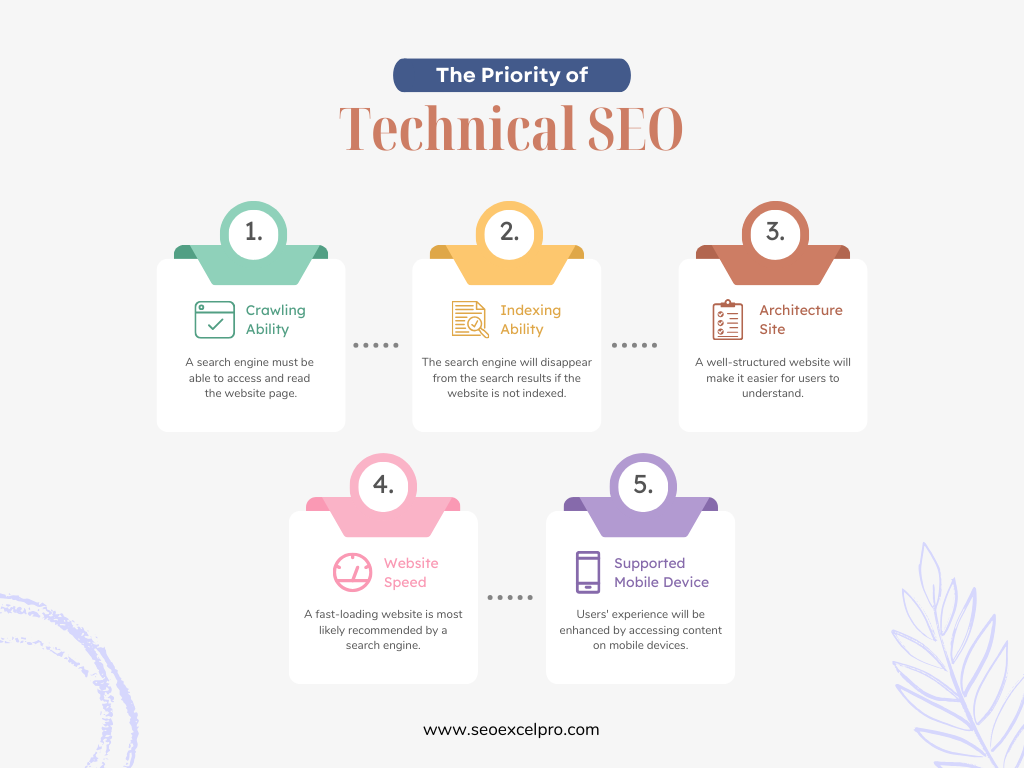In the ever-evolving world of search engine optimization (SEO), technical SEO forms the backbone of a well-optimized website. It’s the foundation that ensures search engines can crawl and index your site effectively, leading to better rankings and visibility. If you’re an SEO specialist, understanding and applying technical SEO is crucial to ensuring your website’s structure, speed, and overall performance are top-notch. This detailed guide will walk you through everything you need to know about technical SEO and how to implement it successfully.



What is Technical SEO?
Technical SEO refers to the process of optimizing a website’s infrastructure to meet the requirements of modern search engines. Unlike on-page SEO, which focuses on content, or off-page SEO, which emphasizes backlinks, technical SEO ensures your website meets technical standards for search engines to crawl and index it efficiently.
Key components of technical SEO include site speed, mobile-friendliness, security, structured data, and ensuring there are no technical issues that could prevent your website from ranking highly.
Why is Technical SEO Important?
Technical SEO plays a pivotal role in making your website more visible and user-friendly. Search engines like Google prioritize user experience, and a technically sound website delivers that. As an SEO specialist, you should always prioritize technical SEO to improve search rankings, drive organic traffic, and enhance the overall functionality of your site.
Here’s why technical SEO is important:
- Improved Crawling and Indexing: Search engines use bots (crawlers) to scan your website’s pages. A well-optimized website helps these bots understand your content and index it effectively, making it more likely to appear in relevant search results.
- Faster Page Load Speed: Site speed is a critical ranking factor. A slow-loading website not only frustrates users but also affects your rankings. Optimizing for speed ensures both users and search engines have a seamless experience.
- Enhanced Security: HTTPS, a secure version of HTTP, is essential for maintaining trust and ensuring data security. Search engines also prioritize secure websites, so implementing HTTPS is a fundamental part of technical SEO.
- Mobile Optimization: With the rise of mobile browsing, search engines now prioritize mobile-friendly websites. If your website isn’t optimized for mobile, it’s less likely to rank well.
Key Elements of Technical SEO
As an SEO specialist, you’ll need to focus on several key areas to ensure your website is technically optimized. These include:
- Site Structure: A clear and logical site structure helps search engines crawl and index your content more effectively. Ensure your site is well-organized with a simple URL structure that is easy for both users and search engines to navigate.
- XML Sitemaps: XML sitemaps provide a roadmap of your website’s structure to search engines, helping them understand which pages to crawl. Ensure your sitemap is up-to-date and submitted to Google Search Console.
- Robots.txt File: This file tells search engine crawlers which parts of your website they can and cannot index. A well-configured robots.txt file is essential for controlling the flow of search engine crawlers through your site.
- Page Speed Optimization: Fast-loading websites offer a better user experience and rank higher on search engines. To improve page speed, compress images, leverage browser caching, and minify code (CSS, JavaScript, and HTML).
- Mobile Optimization: Google uses mobile-first indexing, meaning it primarily uses the mobile version of a site for ranking and indexing. Ensure your website is fully responsive and optimized for mobile devices, offering a smooth experience across all screen sizes.
- Canonicalization: Duplicate content can confuse search engines and lead to ranking penalties. Implement canonical tags to signal the preferred version of a webpage to search engines and avoid potential issues.
- SSL Certificate (HTTPS): Security is a priority for both users and search engines. An SSL certificate ensures your site is secure, and search engines prefer to rank HTTPS sites higher than HTTP ones.
- Structured Data (Schema Markup): Structured data helps search engines better understand your content. Implementing schema markup can also lead to rich snippets in search results, which can increase click-through rates and drive more traffic to your website.
Common Technical SEO Issues to Avoid
While technical SEO is crucial, it’s easy to overlook some common issues that can negatively impact your site’s performance. Here are some common pitfalls:
- Broken Links: Broken links create a poor user experience and can hurt your search engine rankings. Regularly check for and fix broken links on your site.
- Missing or Improperly Configured Redirects: Ensure that all outdated or deleted pages are properly redirected (using 301 redirects) to relevant content to maintain SEO value.
- Duplicate Content: As mentioned earlier, duplicate content confuses search engines. Use canonical tags to prevent this issue.
- Slow Server Response Times: If your server is slow to respond, it will affect your site’s load time, which can hurt rankings. Ensure your hosting provider is reliable and offers fast response times.
Conclusion
Technical SEO is a vital component of a successful SEO strategy. By optimizing your website’s structure, speed, and overall functionality, you improve its visibility and performance in search engine rankings. As an SEO specialist, focusing on technical SEO will not only help search engines crawl and index your site more effectively but also provide users with a seamless experience that encourages them to stay longer and return.
Ensuring your site is technically sound requires continuous monitoring and optimization, but the results—improved rankings, increased traffic, and enhanced user experience—are well worth the effort. Start implementing these technical SEO practices today to elevate your website’s performance and take your SEO efforts to the next level.
